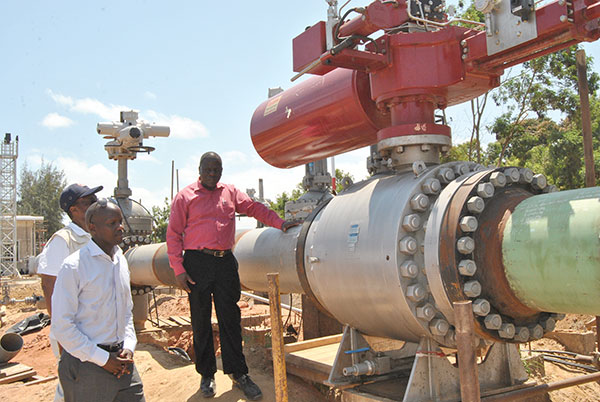November 2018
Features
Kenya Expands Oil Pipeline Network Amid Controversy
By Shem Oirere
Kenya Pipeline Company (KPC), East Africa’s largest oil transporter, has been implementing major capacity expansion projects in spite of mounting criticism of flawed tendering processes and claims of impropriety involving two additional pipelines, an oil jetty and replacement of hydrant pit valves at the Jomo Kenyatta International Airport in the capital Nairobi.
KPC, the state-owned oil transporter with a pipeline network of 833 miles (1,342 kms), is getting ready to commission one of the two new projects: a $480 million, 20-inch oil pipeline and linking the port city of Mombasa to Nairobi after 43 months of delay.
The other new pipeline, known as Line 5, is a 280-mile (450-km) project, which is being constructed by Lebanese contractor Zakhem International Construction Ltd under the consultancy of Shengli Engineering and Consulting Company Limited of China. Line 5 runs parallel to a 14-inch pipeline constructed in the early 1970s by the same contractor.
KPC and Zakhem have blamed the delay in completing the project on court cases, lapses on the part of Shengli Engineering and delays by the Ministry of Finance to disburse payments to the contractor. The pipeline’s design was also changed from an initial 16-inch pipeline to a 20-inch pipeline, which Zakhem contends added project delays and costs.
According to KPC Managing Director Joe Sang, KPC has paid Zakhem 97.3% of the total project value and the project was 99.5% complete as of June 2018. KPC has also introduced 41 million liters of petroleum products into the system, which he added was half-way through at 135 miles (217 kms) at Mombasa as pre-commissioning procedure and that by June 4 had moved 127 km on the 450-km line.
Although Zakhem has lodged four extension of time (EOT) claims for a total amount of $189 million, Sang says none of the claims has been paid by KPC.
The Mombasa-Nairobi oil pipeline contract was signed in July 2014, but works were delayed for several months after some bidders challenged the tendering process in court. The pipeline, which has a lifespan of 30 years, has an installed flow rate of 1 million liters/hour to be increased to 1.9 million liters/hour by 2023 and 2.6 million liters/hour by 2044.
The project also entails a fiber-optic cable, four new pump stations, and two booster pumps. At its termination point in Nairobi, KPC has installed four new oil storage tanks to increase capacity to 133 million liters of automotive gas oil, motor spirit premium and Jet A-1 products.
Despite these improvements, KPC needs additional capacity for deliveries to western Kenya and beyond to other countries in East Africa.
“The major challenge in pipeline transportation is low pipeline capacity constraints between Nairobi and western Kenya depots and utilization of KPC system as a storage and trading tool instead of supply system,” according to a report by Kenya’s Ministry of Energy.
KPC is building its capacity to support the enhanced Mombasa-Nairobi oil pipeline infrastructure via construction of a new oil jetty in Kisumu, an additional loading facility at the Eldoret oil depot and a new oil pipeline between Sinendet and Kisumu on the shore of Lake Victoria.
A new 75-mile (122 km), 10-inch Sinendet-Kisumu oil pipeline known as Line 6 was constructed parallel to the existing 6-inch Line 3 to address frequent fuel-stock outs at the Kisumu depot. Completion of the $57.5 million project has enabled KPC to increase pumping of fuel at the Kisumu depot by 360,000 liters/hour, a major boost in addressing increasing demand for petroleum products in the Great Lakes region.
KPC’s pipeline projects are closely linked to the $17 million Kisumu oil jetty project contracted to Southern Engineering Company to be linked to a similar one in Uganda that is currently under construction.
Oil pipeline projects in Kenya are targeting an increased share of the 500 million liters of petroleum products demand by the regional market especially Uganda, northern Tanzania, Rwanda, Burundi, eastern DRC and partly Zambia.
Meanwhile, Kenya awaits a report on the study for the proposed 510-mile (820-km) Lokichar-Lamu crude oil pipeline as the country plans to scale up the crude oil production in Turkana county to the north. Initial project estimates show the pipeline linking Lokichar oil fields to the coastal port town of Lamu would cost $2.1 billion.
The Ministry of Energy signed a joint development study agreement with Tullow Oil, Africa Oil and Maersk Oil to carry out a study, which will pave the way for technical details and negotiations on financing and ownership structure. Construction of the pipeline could be completed in 2021. P&GJ
Author: Shem Oirere is a freelance journalist based in Nairobi, Kenya. He holds advance diplomats in journalism from London School of Journalism and in Human Resource Management in International Relations and Diplomacy from the University of South Africa.







Comments